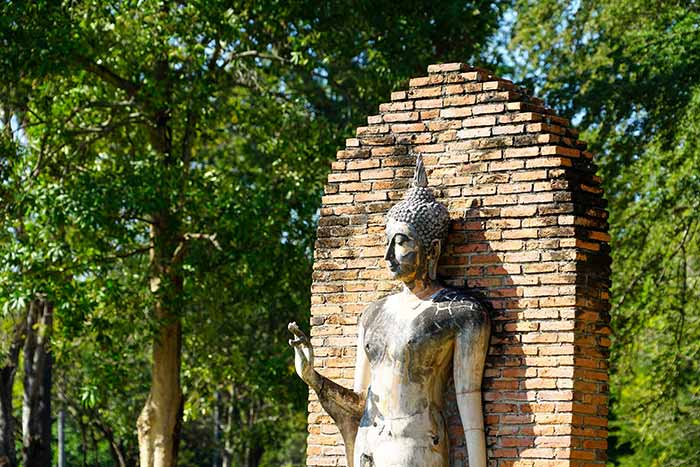


The word “buddha (佛 fo)” literally means someone who is awakened or enlightened. In Buddhism, there are different levels of enlightenment: self-enlightenment, enlightening others, and perfect enlightenment. A buddha is one who has perfectly accomplished this threefold enlightenment.
Buddhist scriptures teach, “The mind, buddha, and sentient being: there is no difference among these three.” Whether a sentient being or a buddha, everyone has this very mind. When this mind is enlightened, we are among the buddhas; when this mind is confused, we become sentient beings; when the mind gives rise to erroneous views (邪見 xie-jian), we find ourselves in the realm of maras (魔 mo).
In the Tang dynasty, there was a Chan master named Damei Fachang (大梅法常; 752-839). Before he became enlightened, Chan Master Damei Fachang used to wonder, “Why does it take three incalculable eons (三大阿僧祇劫 san-da-a-seng-qi-jie) to become enlightened?” For him, that was far too long! He pondered, “Is there a shorter, more direct way?” So, he started seeking wise teachers to guide him to the true Way. Once, he asked the Chan Master Mazu Daoyi (馬祖道一; 709-788), “What is the buddha?” Master Mazu replied, “ The mind is the buddha (即心即佛 ji-xin-ji-fo).”This is similar to the teaching of the Fourth Patriarch Daoxin (四祖道信; 580-651): “ That which is without a mind cannot ask about the buddha; that which can ask about the buddha must have a mind.” If we don’t have a mind, how can we ask questions to understand the Buddhadharma? This very mind, which is asking what the buddha is, is exactly the buddha. Master Fachang, upon hearing Mazu’s answer, suddenly became enlightened: he realized that all things in the world are complete and perfect, just as they are. This very mind with which Shifu is speaking the Dharma and this very mind with which you are listening to the Dharma is originally pure and unmoving in suchness (如如不動 ru-ru-bu-dong). This very mind is exactly the mind of the buddha, or as stated in The Avatamsaka Sutra: not giving rise to the deluded mind of mundane beings is the way to unsurpassed enlightenment.
After his awakening, Chan Master Fachang retreated to a hut on Mount Damei to “nurture the sacred embryo of enlightenment (保養聖胎 bao-yang-sheng-tai).” Some time later, he had a great breakthrough in his cultivation and his fame spread.Hearing the news of Fachang’s success, Master Mazu sent a disciple to assess the state of his realization. Upon meeting Chan Master Fachang, the disciple asked, “What do you rely on to live on this mountain?” The Chan Master replied, “I rely on Master Mazu’s teaching ‘the mind is the buddha’ to cultivate on this mountain and nurture my realization of the mind.”
The disciple then told him, “Master Mazu used to say ‘the mind is the buddha.’ But now, he says, ‘neither mind, nor buddha (非心非佛 fei-xin-fei-fo).’”Hearing this, Master Fachang just replied, “The old master likes to fool around. Whatever he says now, I will continue practicing ‘the mind is the buddha.’” Returning to Master Mazu, the disciple reported, “Fachang has no care for ‘neither mind, nor buddha,’ but only focuses on ‘the mind is the buddha.’” Hearing this, Chan Master Mazu happily announced to his disciples, “ The Plum is ripe now, so I cannot fool him anymore.” Having realized right view and understanding, Master Fachang’s mind abides in the original nature, and his realization deepened day by day. Afterwards, he started to expound the Chan teachings widely around Mount Damei. Because he lived in Mount Damei (Great Plum), everyone called him Chan Master Great Plum.
Realizing the truth of “the mind is the buddha,” we come to understand all words and speech are just expedient means (方便 fang-bian). It is like the saying, “Only the person drinking the water knows if it is hot or cold.” This very mind is neither arising nor ceasing; it dwells on nothing. When the mind knows clearly without delusion, and is always in command and unmoving in suchness, then it is the buddha. However, this mind is not the buddha when it gives rise to deluded thoughts, afflictions, or erroneous views. So, we must always reflect on our mind with intrinsic awareness and not give rise to any deluded or unwholesome thoughts. Keeping our mind in constant clarity and lucidity, having both samadhi stillness and prajna wisdom, we will then surely not be troubled by any afflictions or suffering in our daily life.